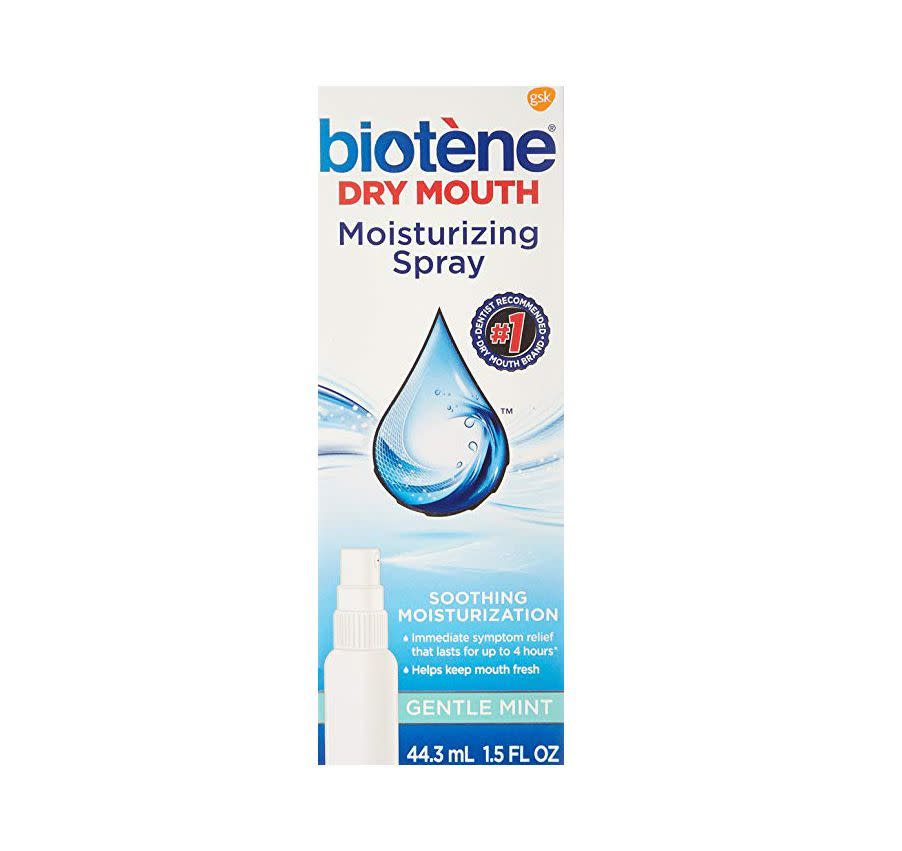10 Reasons You Should Never Ignore a Swollen Uvula, According to Doctors

"Hearst Magazines and Yahoo may earn commission or revenue on some items through these links."
That dangly thing in the back of your throat (a.k.a. your uvula) is pretty important—it helps you swallow your food, allowing you to eat and speak properly. But, you probably don’t think about it much unless you notice you have a swollen uvula, or uvulitis. Like a swollen tongue or swollen feet, your uvula can balloon for a number of reasons, so we tapped the experts to find the most common causes.
“The uvula is the punching bag located at the back of the soft palate, and helps to close off the upper throat from the lower throat during swallowing and speech,” says Craig Zalvan, M.D., associate professor of clinical otolaryngology at New York Medical College. “Swelling of this small structure (uvulitis) isn’t very uncommon, but it can occur in certain situations.”
On the rare occasions it does swell, it’s usually in combination with more obvious swelling in the throat and swollen tonsils. “Mild swelling associated with a known cause, like trauma, and without progression of symptoms, can be monitored,” says Dr. Zalvan.
But if the swelling is causing you pain or is getting worse, a visit to your doctor or the ER may be necessary—especially if you’re experiencing trouble swallowing or breathing issues, as this could be a sign of an acute allergic reaction. Similarly, if your uvula is getting bigger gradually and you also feel like there’s a lump in your throat, you should have it evaluated by your doctor.
Ahead, experts reveal the symptoms of a swollen uvula, along with what might be causing your uvula to inflate.
What are the symptoms of a swollen uvula?
No matter the cause of your swollen uvula, you’re likely to experience a variety of related symptoms. According to Omid Mehdizadeh, M.D., otolaryngologist (ENT) and laryngologist at Providence Saint John’s Health Center in Santa Monica, California, here are the most common symptoms:
Globus (a sensation of a lump in your throat)
Difficulty breathing
Trouble swallowing
Pain or soreness in the throat
Voice changes
Snoring
What causes a swollen uvula?
1. Your stomach acid is on the move
Chronic acid reflux or vomiting will cause acid in the throat. “This will irritate the throat and uvula, potentially causing swelling and inflammation,” says Clare Morrison, M.D., general practitioner and medical advisor at MedExpress. You may also experience other pesky symptoms like voice changes and the sensation of there being a lump in your throat.
Diet and lifestyle modifications can be helpful in keeping your stomach acid in check, such as nixing acidic foods and drinks from your repertoire (including fizzy ones), along with spicy foods, says Dr. Morrison. “There’s acid-suppressing medications that will help if necessary, like omeprazole or lansoprazole,” she adds.
2. You experience dry mouth
The cells that line the mouth, throat, and uvula function best in the moist environment that usually exists in this part of the body, says Dr. Morrison. But if the mouth is chronically dry despite how much water you guzzle (say, because of a stuffy nose or side effect of certain medications), this causes your uvula to become inflamed, and consequently, red, sore, and swollen.

Gentle Mint Moisturizing Mouth Spray
amazon.com
$20.50
amazon.comIt may help to drink regular sips of water or use a moistening mouth-spray to keep your mouth from drying out. If nasal congestion is to blame, you can improve ventilation by using steam inhalations with added eucalyptus oil, mentholated candies, nasal sprays, and regular nose-blowing, says Dr. Morrison.
Dry mouth during sleep is typically a sign of nasal obstruction. “The constant vibration of the uvula during snoring may cause it to swell,” says Dr. Mehdizadeh. “Addressing the nasal obstruction medically or surgically, or utilizing a chin strap may be effective.”
3. There is injury or irritation to the area
“Trauma to the uvula isn’t particularly common, but it can be burned by hot food,” says Dr. Morrison. Sometimes it’s injured during intubation (when a tube is passed down the throat during general anesthesia) or a tonsillectomy. Generally, it will heal up without treatment—sucking on ice chips or using a local anesthetic mouth spray can help soothe the area.
4. You snore
If you tend to snore and you have a swollen uvula, you might be falling victim to a vicious cycle. “The actual act of snoring can make the uvula bigger, and then a bigger uvula causes more snoring,” explains Dr. Mehdizadeh. A visit to an ENT or sleep doctor might be in order if you believe excessive snoring may be the culprit of your health issues.
5. You consume too much alcohol or smoke cigarettes
Drinking alcohol and smoking are both irritating to the lining of the throat and uvula, and can cause redness, irritation, and swelling. “The problem is compounded when drinking and smoking is combined, as the cigarette smoke will dissolve in the alcohol, making it spread around the throat more extensively,” says Dr. Morrison.
The best way to keep this from happening again is to stick within the daily intake recommendations for alcohol (up to one drink per day for women and two for men), and to quit smoking—your doctor can hook you up with local programs that are available to help, says Dr. Morrison.
In the meantime, supportive care can be helpful in soothing the area as it heals, says Dr. Mehdizadeh, such as salt water gargles and lozenges.
6. You may be allergic to something
Allergic reactions are a relatively common cause of throat swelling in general, but sometimes the uvula can be affected alone. “This is known as uvular angioedema,” says Dr. Morrison. Pinpointing the source of the allergy and steering clear of it is obviously the best course of action (if you’re unsure of what might be causing the reaction, your doctor can run tests).
You may be able to ease your symptoms by taking antihistamines. “If the reaction causes difficulty swallowing or breathing, medical attention should be sought immediately, as it can be life-threatening,” says Dr. Morrison.
7. You have a bacterial infection
The most common bacterial infection affecting the throat is strep throat, which can irritate the uvula and cause swelling. “There may be pus, and it will be painful to swallow, potentially causing drooling,” says Dr. Morrison.
Tonsillitis usually affects both tonsils, but can result in uvula swelling because of the infection and inflammation. “At times, one tonsil is infected and an abscess can occur that causes one-sided tonsil swelling and the uvula to swell and deviate away from the affected side,” says Dr. Zalvan.
In both cases, your doctor will do a throat culture to confirm the infection, then prescribe antibiotics to get rid of it, along with drainage if there’s an abscess.
8. You’re fighting a virus
There are several viral infections that can affect the throat and uvula, many of which also cause cold symptoms (runny nose, cough, laryngitis). “Some viruses, like coxsackie (hand, foot, and mouth disease), can affect the uvula and cause mild areas of ulceration and swelling,” says Dr. Zalvan.
Viral infections usually go away on their own within 10 days—and while your body’s fighting the infection, Dr. Morrison recommends getting lots of rest, eating healthy foods, and drinking plenty of fluids. Lozenges and ice chips can also help soothe the area in the meantime.
9. It’s a side effect of medication
Any medication can cause an allergic reaction, says Dr. Zalvan, but some medications can cause them more often, such as ACE inhibitors (a blood pressure medication). “As part of the reaction, the uvula and other throat structures swell,” he says. Anti-inflammatories, such as aspirin, are another notorious culprit.
Meanwhile, other medications can cause a dry mouth by reducing saliva secretion, says Dr. Morrison. These include antidepressants and treatments for overactive bladder.
If you suspect your medication is causing a swollen uvula, talk with your doctor about alternative treatments—and seek immediate medical attention if you’re experiencing an allergic reaction, as this can cause serious issues, such as choking and difficulty breathing.
10. It could be (but probably isn’t) oral cancer
Cancer of the oropharynx (very back of the throat) may start at the uvula. “This is rare, but can occur,” says Dr. Mehdizadeh. The primary cause is the human papillomavirus (HPV). Any part of the uvula that swells and grows slowly could indicate a benign or malignant tumor.
“Benign tumors, such as HPV-mediated growths or warts, can affect the uvula and tend to grow very slowly over time,” says Dr. Zalvan. “Malignant lesions can also develop, especially in smokers, and tend to grow more quickly, ulcerate, bleed, or cause pain.”
You may also experience the sensation of a lump in your throat, difficulty swallowing, ear pain, or food or liquid backing up into your nose. The sooner you head to the doctor’s for tests, the sooner the cause of your swollen uvula can be confirmed and treated.
Stay updated on the latest science-backed health, fitness, and nutrition news by signing up for the Prevention.com newsletter here. For added fun, follow us on Instagram.
You Might Also Like

